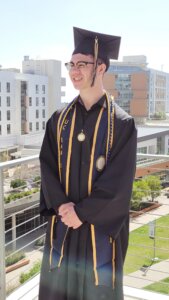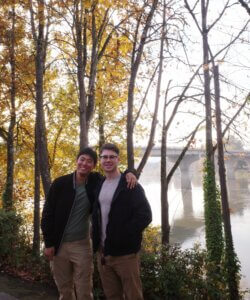When you talk to Aaron McCully, one thing stands out right away: he loves seeing students reach that moment when a tricky concept finally makes sense. For him, teaching is about more than explaining code. It is about helping kids stay confident through challenges and giving them tools to solve problems on their own. Aaron is one of our newer instructors at CodeWizardsHQ, but in a short time he has taught everything from summer camps to core classes, making a big impact along the way.
Discovering Coding Later and Loving It
Aaron’s interest in coding began in high school, a little later than many of the students he teaches today. His school offered a series of four computer science courses, and he jumped in during his junior year. To catch up, he doubled up on classes and finished with a web programming course.
What drew him in was both the subject and the way it was taught. His first computer science teacher set high expectations but made the material exciting and rewarding. “He emphasized that computer science is a very rewarding field,” Aaron said. “Even though he was strict, he kept the class engaging.”
Aaron had always been strong in math, but coding felt different. It turned problem-solving into something tangible and creative. “It felt like the thinking I was doing produced something,” he remembered. That realization shaped his future. By the end of high school, he knew he wanted to study computer science in college.
Shaping a Path Through College
After graduation, Aaron planned his next step carefully. He started at community college, where he explored computer science while also looking into fields that connect technology and design. When it was time to transfer, he chose a program that let him combine coding with courses in cognitive science and design. Those classes helped him think about how people interact with technology and how design shapes the user experience. He also joined a consulting organization and learned to solve problems for real clients.
That mix of coding, design, and problem-solving still shows up in how Aaron approaches teaching. He knows that learning to program is not just about syntax. It is about understanding how people will use what you build.
Finding His Way to CodeWizardsHQ
After earning his degree, Aaron spent some time job searching, recharging after college, and helping his family as they stepped into retirement. Teaching had already been on his mind. His mom spent her career as a special education teacher and encouraged him to consider education. He had also taken a course in education and technology that gave him experience explaining concepts to peers. “I had been told I was good at explaining things,” he said. “I thought, why not try teaching coding and see if it is something I could do well?”
When the opportunity with CodeWizardsHQ came along, it felt like the perfect fit. It gave him a chance to combine his technical skills with the joy of helping students grow.
Teaching at CodeWizardsHQ
Aaron joined during the busy summer season and dove right into a wide range of camps. He taught Fortnite and Roblox game development, as well as AI camps for elementary, middle, and high school students. More recently, he has been teaching Scratch for younger learners and is starting new Intro to Python classes for both middle and high school.
He has also stepped into UI and web programming classes when needed, areas that match his interest in design and user experience. That variety has helped him become comfortable teaching across different skill levels and topics.
When working with younger students, Aaron focuses on connecting what they are doing now to what comes next. “I try to tie the concepts in Scratch to what they will eventually be learning in text-based programming,” he explained. “It helps them see the bigger picture.”
Memorable Teaching Moments
Aaron especially values the times when he can pause and help a concept click for a student or small group. During Scratch lessons, he often looks for ways to connect a visual block to what they will later write in Python or JavaScript. Watching students discover a new feature, add it to their projects, and light up with excitement is one of his favorite parts of teaching.
He also enjoys working with advanced learners who move quickly through material. When that happens, he looks for chances to go deeper, explain how a feature works behind the scenes, and show how it fits into more complex programming. These moments let curious students stretch their skills while staying engaged.
What Makes a Perfect Class
For Aaron, the best classes are the ones where understanding grows and confidence builds. “If a concept is hard, we break it down and take our time,” he said. “It is normal to struggle in computer science. When it clicks later, that is the best part.”
He loves when students start making their own connections, linking a coding idea to something they already know or finding their own solution to a problem. “Sometimes the way they connect the dots is unexpected and really cool to see,” he shared.
A Teacher Who Keeps Learning
Teaching has sharpened Aaron’s own skills as well. Patience is at the top of his list, both with students and himself. He has also found value in revisiting fundamentals. Explaining core concepts again and again highlights small gaps, introduces features he may not have used before, and reinforces important building blocks. “Reviewing fundamentals is always useful,” he said. “You can notice things you had not thought about in a while.”
Students sometimes surprise him with their own approaches too. “They will show me a different way to do something, and it works,” he said. “It keeps things fresh.”
Advice for Parents
When parents wonder whether coding classes are worth it, Aaron points to the way CodeWizardsHQ builds skills step by step. Students can start with fun, visual projects in Scratch, then move into text-based programming like Python and continue through web development and beyond. Each weekly class builds on the last, so students grow steadily in confidence and capability.
“Coding knowledge is useful in almost any field,” he explained. “Even if students do not go into tech, learning to think logically and solve problems will help them in whatever they choose to do.”
Life Beyond the Classroom
Outside of teaching, Aaron is a creator and explorer. Music has been a steady part of his life since grade school, when a teacher introduced him to the Beatles and their films. At home, his family has turned the garage into a music room filled with instruments. Aaron plays piano, mostly for fun, and recently joined one of his dad’s weekend jam sessions for the first time.
He also stays active. In college he spent time weightlifting, and now he mixes biking, hiking, and casual tennis with a friend. Riding long distances, exploring trails, and rallying on a tennis court are favorite ways to recharge and balance screen time.
Aaron enjoys building tech projects for his home, too. One favorite is a voice-activated smart mirror that shows time, weather, quotes, music, and even videos during the morning routine. He is now planning a wall-mounted home dashboard with an AI assistant to connect everything in one place. It is the perfect blend of programming, design, and practical problem-solving.
Gaming is another passion. Aaron loves the fast pace of first-person shooters like Valorant and Overwatch and enjoys immersive story games such as the Batman Arkham series and Subnautica. The focus and strategy required feel a lot like solving a coding problem.
Inspiring the Next Generation
In just a few months at CodeWizardsHQ, Aaron has taught students across ages and skill levels. He has introduced brand-new coders to their first loops, guided advanced learners into deeper understanding, and helped summer camps run smoothly and creatively. Through it all, he keeps the focus on growth and the excitement of figuring things out.
“It is normal to struggle in computer science,” Aaron said. “When we slow down, connect the dots, and keep practicing, it clicks. That is when the fun starts.”


